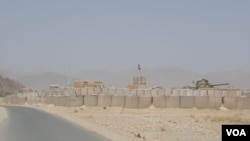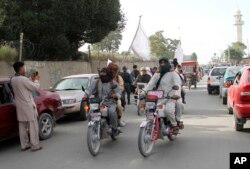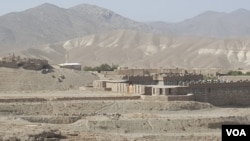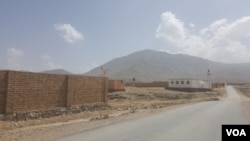The young man and three older men agreed to talk under the condition that neither their names, nor pictures would be used, as any identifying markers could put their lives at risk. In this area near Kabul, the Taliban have gained a stronghold.
The younger man said the Taliban come regularly to this village to shop. The village is Khak-e-Jabbar, a district of Kabul province, less than an hour’s drive from Afghanistan’s capital. It has dozens of small villages, with populations ranging from 100 to several hundred people each.
For years the Taliban had tried to get a foothold in this area. This year, they appear to have succeeded. Some blamed it on the cease-fire between the government forces and the Taliban in June, the first of its kind in 17 years of conflict, that allowed Taliban fighters to freely roam the area.
According to the U.S. military newspaper Stars and Stripes, the Afghan Defense Ministry acknowledged in July that “Khak-e-Jabar was the only area where the recent cease-fire exacerbated the security situation.”
A local TV channel, Tolonews, quoted Khak-e-Jabar Police Chief Mohammad Edris Yadgari in August as saying the number of Taliban had increased four-fold since the cease-fire. In a different story, Tolo quoted residents as saying the Taliban had gained influence in dozens of villages.
Some cooperation with Taliban
The three older men, veterans of the first Afghan jihad against the Soviets, thought the cease-fire had nothing to do with it. The situation, they said, had been deteriorating since the start of the Afghan New Year in March. They spoke in Pashto to the younger man, who translated their words in English.
“In this area, no one cooperated with the Taliban before. But now, some people have started helping them and giving them information,” one said.
They said the Taliban had started dispensing justice in some Khak-e-Jabbar villages through their mobile courts. They said every night, cell phone service in the area was turned off for about 12 hours. They thought the cell phone companies were forced to limit the service under threats from the Taliban.
When one company, MTN, continued providing service in the area after 6:00 pm a few months ago, they said the Taliban blew up its tower.
MTN has not replied to VOA’s request for comment.
Sayed Sulaiman, the civilian chief of the district administration, acknowledged the cell service disruption, but attributed it to maintenance work.
Taliban spokesman Zabiullah Mujahid said they order cell service to be shut down in the evenings because Americans allegedly monitor phone calls and their raids or strikes “lead to civilian casualties.”
"The use of improvised explosive devices (IEDs) in attacks by Anti-Government Elements remained the leading cause of civilian casualties," according to a report issued by the U.N. Assistance Mission in Afghanistan (UNAMA) in July this year.
Aminullah Habibi, a Kabul-based analyst who has advised NATO, said the suspension was to allow Taliban militants freedom of movement.
“They would probably like to prevent the locals from letting the government know that they are coming or going or who are they,” he said. “It’s not restricted to this area, in many areas where they have control they try to impose those types of restrictions.”
Taliban demands
Recently, residents say, the Taliban started occasionally coming to the villages and demanding residents provide them dinner. If it was a big group of militants, they would divide into smaller groups and go to multiple houses.
In August, on Eid al Adha, a Muslim holy festival, after the cell signals dropped out in the evening, the Taliban members came to the mosque of Malang, gathered locals, and preached to them.
“During the day they can’t come to our area since we are so close to the police compound,” said the younger man, “but at night people get up several times to check on things.” His relatives sleep with their guns on the ready.
The Taliban have also delivered an ultimatum, everyone in the area who worked for the government, and many did, had to quit their jobs within 18 months.
It was not a bluff. A 70-year-old man, Qumandan Nazar from Chakri village, who worked with the district police, was killed on his way to work.
Taliban spokesman Mujahid said the directive for people to leave government jobs was not just for Khak-e-Jabbar, it was countrywide.
“We ask that everyone should leave jobs that serve the Afghan government that is a slave to Americans,” he said.
Many people were considering options, including moving to the city. Many were relying on relatives in Kabul to help them get jobs as security guards, or drivers, or small shopkeepers.
Islamic Emirates ID cards
Locals said people who left their jobs after the Taliban ultimatum, but stayed in the area had been issued Islamic Emirates ID cards. That is the name Taliban use to describe their self-styled government. Card holders could move about freely in Taliban areas. However, no one had a picture of that card.
“People who have them hide it,” they said. “No one wants to show they have a Taliban ID.”
Mujahid said the Taliban help provide security to those who leave their government jobs.
This summer, when the government needed engineers to survey the area for a dam in the Rojan valley, it sought help from the local elders, who in turn contacted the Taliban. Eventually, the survey was carried out under Taliban security.
District chief Sulaiman denied the government sought Taliban help for the project, “We used local elders’ help and their protection.”
The three old men, though, said the Taliban were physically present during the study.
Elders in Afghanistan often play a key role in negotiations between the government and militant groups. In several incidents, elders have played a role in getting Afghan hostages released from the Taliban.
Government performance questioned
Sulaiman said while the Taliban presence in the area had been an issue this year, it was more or less under control. “Some government officials visited the area today,” he said, “and there was no issue.”
A local man contacted by phone said the Taliban movement had decreased in the past few weeks because of the weather, and not because of any government action.
Most of the locals say they were impartial between the government or the Taliban, albeit out of fear.
“We have informers from both sides in our midst,” said one resident.
Habibi said while it raised questions on the performance of the government that it was allowing the Taliban to gain a foothold in the area, in the end it was a “reflection of the general security situation in the country.”
“I don’t think it is significant enough to threaten the city,” he said. Many Afghan cities, like Ghazni, he pointed out, had a Taliban presence around it. In August, a Taliban offensive against Ghazni, was repulsed after several days of fighting.
The Afghan Interior Ministry has not replied to requests for comments for this story.







